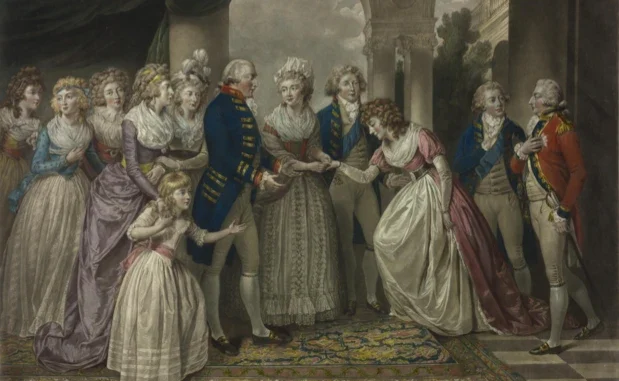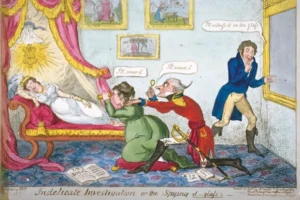
From illicit affairs to assassination attempts, Felicity Day reveals the scandals that rocked the court of King George III and Queen Charlotte, whose relationship is the focus of a new Bridgerton spin-off series
It’s often said that the court of George III and Queen Charlotte was dull and censorious. “The palace of piety,” Horace Walpole called it. The royal couple were famously frugal, and far from having a bevy of buxom mistresses like his grandfather George II, the king had no woman in his life but his wife, mother of his 15 children. He and Charlotte were known to look askance on the adultery and excesses of their aristocratic subjects.
Yet their court was to be rocked by scandals – and the biggest of them were of the royal family’s own making.
Royal adultery
It was one of George III’s brothers who dragged the family into the scandal sheets in his first decade as king. In December 1769, the papers divulged that an assignation between Henry, Duke of Cumberland, and his lover, Lady Grosvenor (sister of one of the queen’s ladies) had been interrupted by her husband’s servants. The pair had been caught together in a bedchamber at a busy coaching inn in St Albans, their clothing in disarray. Lord Grosvenor had promptly hauled the duke into court, and during a trial for ‘criminal conversation’ with his wife, all manner of embarrassing details about the rakish royal were revealed – from the apparent enjoyment he had taken in dressing up in disguise for their secret trysts, to the lamentable spelling in his love letters.
All manner of details about the rakish royal were revealed – including the apparent enjoyment he had taken in dressing up in disguise for secret trysts
Forced to foot the £13,000 bill for damages and fees, the king was furious that his sibling had shown so little regard for the moral responsibility that he (and many of his subjects) believed came with exalted rank. But he was all the more angry in 1771, when he learned that the serially philandering Henry had taken to the altar flamboyant widow Anne Horton, daughter of a baron dubbed ‘the King of Hell’ thanks to his womanising ways. He described the union as “a disgrace to the whole family” – though it became far more than that. George’s anger led to the creation of the Royal Marriages Act 1772, which rendered illegal the marriage of any royal under the age of 25 without the monarch’s consent, the only exception being descendants of princesses who married into foreign families.

Whether it was because they knew that any marriage sanctioned by their father would prioritise European politics over passion, most of George and Charlotte’s seven surviving sons chose lifestyles as rakish as their uncle Cumberland’s.
George, Prince of Wales distressed them particularly with a string of indiscreetly conducted love affairs, and was known to have defied his father’s act and married a handsome Catholic widow, Maria Fitzherbert – only to cruelly cast her aside. His lawful marriage in 1795 to his cousin, Caroline of Brunswick, was to cause even more unwelcome chatter, as he paraded his mistresses at court while pointedly ignoring her, before subjecting the princess to an inquiry into allegations of her adultery and the birth of an illegitimate son. The so-called ‘Delicate Investigation’ of 1806 – which acquitted Caroline – was a private matter that in time became a very public scandal, the couple using the newspapers to air their grievances and the nation taking sides. The war of the Wales’ took its toll on the queen especially. “My dislike to everything public is greatly increased,” she told the king at one stage, having found herself caught in the middle of their marital drama.
Secret pregnancy
Interestingly, though, it wasn’t only wayward sons she had to worry about; one of Charlotte’s daughters also brought scandal to her door. Despite the six princesses interacting with few women, let alone men outside ‘the nunnery’ (as they called the royal household), in 1801, gossips began to debate whether Princess Sophia’s illness the previous summer, while the court was at Weymouth, had, in fact, been a secret pregnancy.
Her sister Elizabeth called it a “fabricated and most scandalous and base report” but historians now believe the rumour was true, and Sophia did indeed give birth to a baby boy in July or August 1800, fathered by one of the king’s equerries, General Thomas Garth, and left with a tailor in the town, whose wife was supposed to pass him off as her own. Fuelled by Garth’s adoption of the child, the reports gathered pace in the years after, when it was said the queen knew of the unvirtuous conduct of her daughter, reportedly so innocent that she had not even known she was pregnant. It appears the gossip did not then leak beyond the morally elastic world of the aristocracy – where such a ‘false step’ was not unheard of – but the scandal certainly damaged Sophia’s reputation. “I have lost myself in the world by my conduct,” she later admitted, “and, alas, have felt it humbly, for many, many have changed towards me”. Lonely, miserable and separated from her son, she lived the remainder of her life in seclusion.